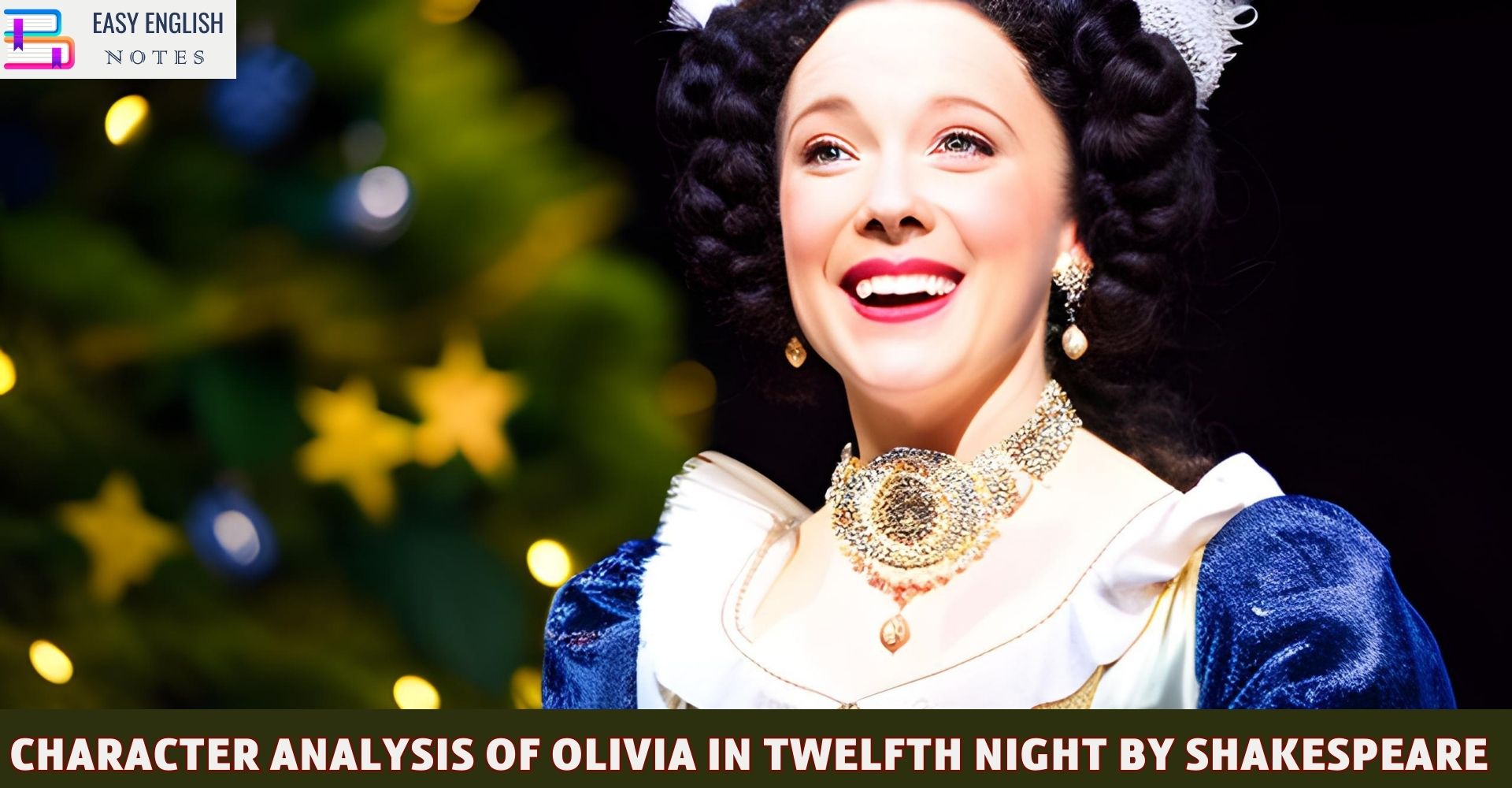The play begins with music-music which reminds the hypersensitive Duke of Illyria. We learn in the first scene that she is a woman of great beauty and surfeit of charm. In the next scene we learn that she is mourning the death of a dead brother. We hear again about Olivia in the third and fourth scene of the first Act. By the time we actually meet her, we have already learnt a considerable amount about her.
Despite the obvious artificiality of her mourning, there is no doubt that she is a great lady, who has an abundance of dignity as well as ability. She rules over her household with care and discretion; so much is she in control of her household that its other members seem to be constantly in awe of her. She also has an intelligence which has an earthy reality. She may appear a bit cold, but this is because she is so self contained; and her inclination to keep her social inferiors at a distance may appear cold and heartless, but are admirable qualities in a Countess. The aloofness does take the shape of arrogance at times, and the compassionate Viola remarks at their first meeting “I see what you are, you are too proud.” It is a pride horn out of rank and social status. Shakespeare brings about parity when he manages to humble her pride. He achieves this when he makes her fall in love with the Duke’s page; and that too after she has announced her self-imposed seven-year mourning for her dead brother, and has repeatedly spurned the Duke’s ardent courting.
Yet since we trust Viola, we are prone to pity Olivia rather than laugh at her. Viola defines the correct response when she says “poor lady, she were better love a dream”, and a little later I pity you.”. Thus Olivia is not a ridiculous lover as Malvolio is -merely her situation is ironically comical.
As we see Olivia’s increasing infatuation, we are aware both of her sentimentality as well as the farcical ramification that they are bound to generate. The ramification becomes serious and her agony increases, when she exposes herself to Cesario, and her suit is rejected by him. We have a mixed response of pity mingled with a feeling that no other response is possible. Yet the pity is never profound, for we are aware that Olivia loves only at a superficial level and lacks real insight. This divided response is available through so many other characters as well.
Also Read :
- Compare Hamlet with Macbeth, Othello and other Tragedies
- “The Pardoner’s Tale” is the finest tale of Chaucer
- Prologue to Canterbury Tales – (Short Ques & Ans)
- Confessional Poetry – Definition & meaning
- Line By Line Explanation Of The Poem The Eve of St. Agnes
Mrs. Jameson comments on Olivia thus: “The distance of rank which separates the Countess from the youthful page-the real sex of Viola the- dignified elegance of Olivia’s deportment, except where passion gets the better of her pride – her consistent coldness towards the Duke – the description of that ‘smooth, discreet, and stable bearing with which she rules her household -her generous care for her steward Malvolio, in the midst for her own distress- all these circumstances raise Olivia in our fancy, and render her caprice for the page a source of amusement and interest, not a subject of reproach.”
The rich Countess of Illyria is as complex a person as she is beautiful and charming. Duke Orsino loves her for her beauty since when she comes “heaven walks on earth” and
“The parts that fortune hath bestowed upon her,
Tell her, I hold as giddily as fortune:
But is that miracle and queen of gems,
That nature pranks her in attracts, my soul”.
If we do deem it necessary to doubt Orsino’s eyes due to his ardour and his sentimentality we are bound to accept Viola’s estimation of her beauty:
“Tis beauty truly blent, whose red and white,
Nature’s own sweet and cunning hand laid on”.
Despite her willful, aggressive and uncontrolled love, and her rather arrogant exterior, there are good qualities in her which more than offset the bad ones. She is kind and sympathetic towards her servants in their hours of distress, though she does tend to be extremely harsh towards them when they go astray. So she in the same woman who one moment rebukes Malvolio for his ill treatment of the Fool and sympathises with him when he is in trouble:
“Set some of my people have a special care of him, I would
Not have him miscarry for half of my dowry.”
The same kind of attitude is evident in her manner of treating Sir Toby. She shows displeasure towards him, but cannot forget that he is a Kingsman. She believes in rigid discipline, which necessarily occasions severity at times: but these are softened by her sympathy and inherent kindness.
Despite her reckless willfulness, we never seem to reproach her. Her impetuous love, her stern concept of discipline, do not bring in us a sense of ridicule for her. On the whole we accept her as an agreeable, even likeable person. Wilson Knight comments The love of Olivia, willful as it is not in the slightest degree repulsive. With the old stories before him, nothing but the refined delicacy of Shakespeare’s conception of the female character could have redeemed Olivia from approaching to the anti-feminine. But as it is we pity her, and we rejoice with her.”
PLEASE HELP ME TO REACH 1000 SUBSCRIBER ON MY COOKING YT CHANNEL (CLICK HERE)











